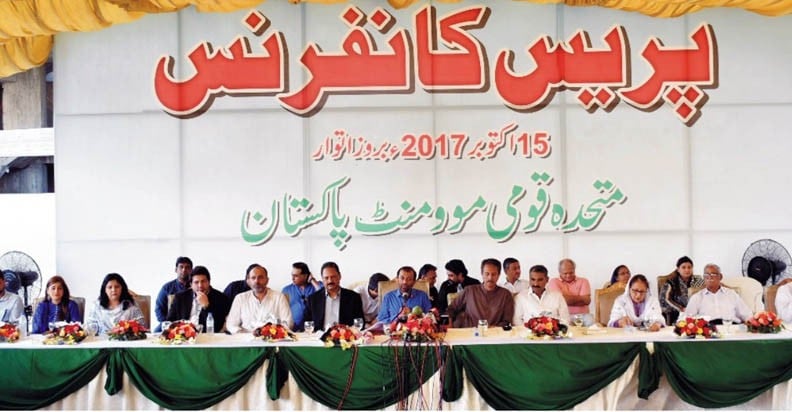
While many challenges still remain, the MQM-P has come a long way in disassociating itself from Altaf Hussain

On the afternoon of October 15, the new headquarter of Muttahida Qaumi Movement-Pakistan (MQM-P), situated in Bahadurabad, was abuzz with activity. A number of new faces -- from fashion, bureaucracy and business -- announced to join the Farooq Sattar-led breakaway faction, MQM-P.
Deepak Perwani, a leading fashionista; Javed Hanif, a retired bureaucrat; Taufeeq Kochin, a prominent member of the Memon community; and Alamgir Firoz, a senior member of the Federation of Pakistan Chambers of Commerce and Industry joined the party on the day.
"The addition of prominent figures in the party shows that the MQM-P still enjoys popularity among the lower and middle classes," says Syed Aminul Haque, the party’s central spokesperson. The party leaders and political analysts following the city’s politics believe that the MQM-P, a name the party adopted to distinguish itself from the London-based party, is still struggling to escape from the shadow of Altaf Hussain following his August 22, 2016 anti-state speech which encouraged the Sattar-led faction to dissociate themselves from London.
Hussain, in his telephonic speech, raised slogans against Pakistan. He called the country "a cancer of the entire world" and ordered its workers to attack media houses, the Rangers’ headquarters and Sindh government’s secretariat.
Since the September 2013 operation in Karachi, the party has faced a number of setbacks, from the bulldozing of sector and unit offices and the shutting down of central headquarter, Nine Zero, to arresting of party leaders, including Sattar, and other members.
For Sattar and his team, running the party without Hussain was the toughest challenge. Analysts believe that the party has successfully kept the party workers away from Hussain’s personality clout and slogans, such as Hamain Manzil Nahi Rehnuma Chahiye and Jo Quaid Ka Gaddar Hai, Wo Maut Ka Haqdaar Hai. The party workers have chanted these slogans since the formation of All Pakistan Mohajir Students Organisation, a student body in the University of Karachi in 1978 that gave birth to the MQM in 1984.
"It was really a challenge but the party leaders have successfully debunked the myth that party cannot be run without Hussain," says Haque.
He adds that after disconnecting the party from London, the leaders have worked hard to regain the confidence of its cadre, insisting that the party took the decision in the interest of the "Mohajir community, its vote bank, Karachi and Pakistan".
Results of PS-114 by-polls in July 2017 show that the Mohajir community continues to support the party even with Altaf Hussain out of the picture. In this mixed ethnicity constituency, which the MQM in the past three elections won with a margin of no more than 600 votes, the MQM-P managed to bag 18,000 votes -- despite the boycott appeal by Altaf Hussain.
At the other end, the MQM-London is in total disarray as the crackdown has completely disconnected the party from Pakistan and is now focusing on international lobbying. But a senior law enforcement officer says, "We are not against a certain party. Our operation is across the board," insisting that the forces have zero tolerance for militancy and violence.
On Sept 18, Rangers claimed the arrest of four suspects belonging to London, Pakistan and Haqiqi factions of the MQM for their involvement in criminal activities.
However, the MQM-P is allowed to operate and carry out public rallies. Two of the party’s sector offices -- Bahadurabad and Mehmoodabad -- sealed after August 22, 2016 diatribe of Hussain have been returned in recent months. The MQM-P has also amended its constitution, removing powers of the party’s founder and abolishing the notorious sector and unit system to introduce an organisational structure at district and union committee levels -- similar to other mainstream political parties.
Zubair Ashraf, a Karachi-based journalist covering the MQM politics, believes that for the first time the party decisions are being made in a democratic way. "Earlier the founder was the sole decision-maker. It is because of the party’s new structure that reports on differences over certain organisational issues within the MQM-P are coming out".
However, unlike Altaf Hussain, Sattar exercises weak control over the party parliamentarians. MQM-P Senator Mian Ateeq’s decision to vote for the Election Reforms Bill 2017 against the party policy is clearly reflective of Sattar’s ineffectiveness.
The upcoming Senate elections will pose another challenge to the MQM-P as the tenure of four, out of eight, the party senators will end in March. There are reports that blocs within the party have been formed to elect their favourite leaders.
Another key challenge faced by the MQM-P was to protect the party from Mustafa Kamal’s and Anis Qaimkhani’s Pak Sarzameen Party (PSP). Many party ideologues changed sides -- Nadeem Razi, an MPA from Karachi, was the ninth lawmakers who joined the PSP on September 17.
Many believe that the PSP is the biggest spoiler around. Its main purpose is to weaken the MQM-P. "Developments after the August 22 diatribe of Altaf Hussain has made the PSP irrelevant after the MQM-P leaders’ chose to dissociate themselves from London," says an academic, wishing not to be named.
The MQM-P is all set to submit applications in the Election Commission of Pakistan for seats in the National Assembly and Sindh Assembly. "The by-polls in the constituencies rendered vacant after the de-seating of defectors will show that the MQM-P is still a potent force," claims Haque.